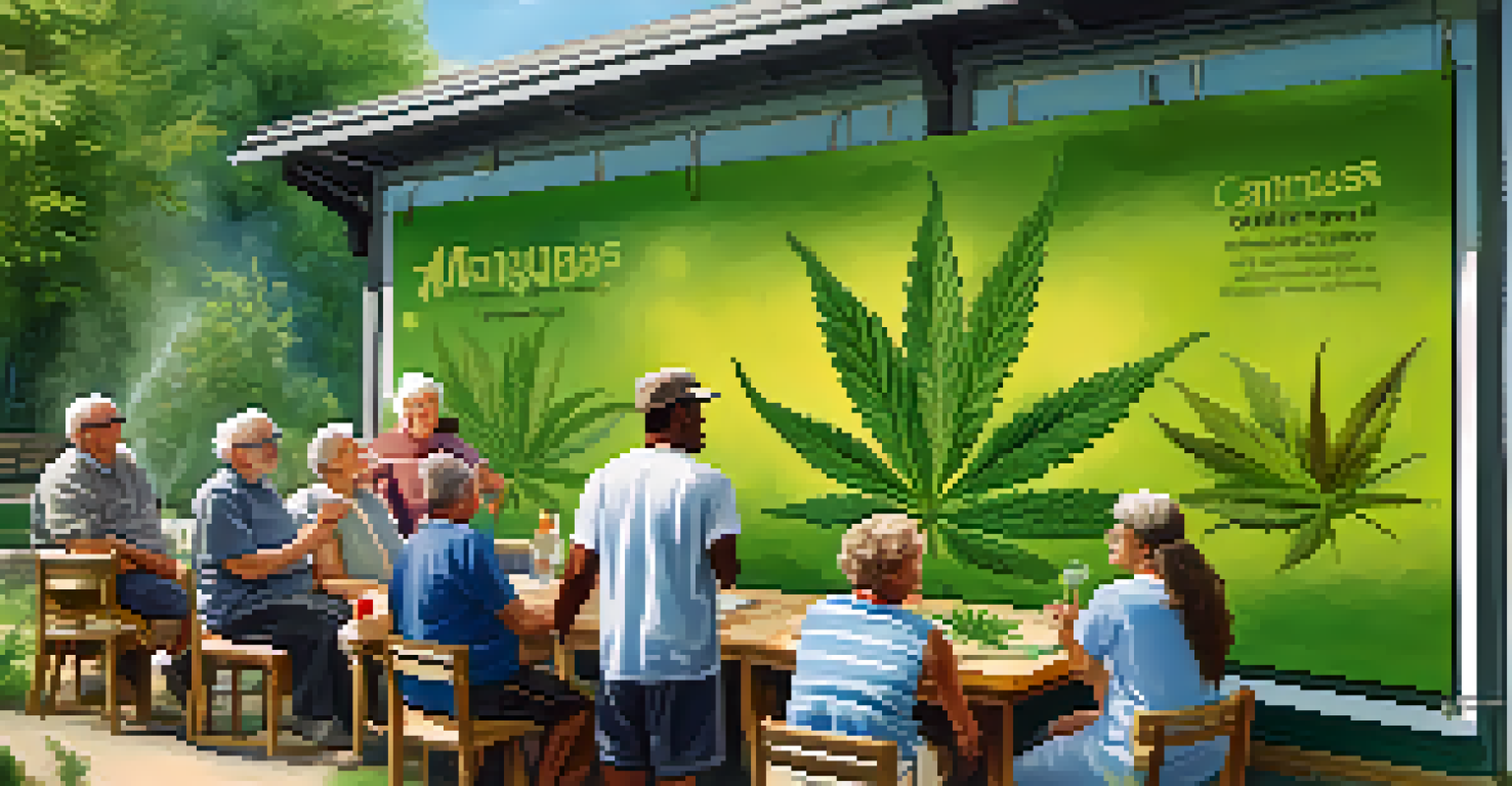Social Perceptions of Marijuana Use in the Elderly Community

The Evolving Attitude Towards Marijuana in Society
In recent years, societal attitudes towards marijuana have shifted dramatically. Once stigmatized, cannabis is now being recognized for its potential benefits, particularly among the elderly. This change reflects a broader acceptance of marijuana as not just a recreational substance but also a therapeutic option for various ailments.
The greatest wealth is health.
Many seniors are becoming more open to exploring marijuana as a treatment for chronic pain, anxiety, and other health issues. This acceptance comes at a time when alternative medicine is gaining traction, prompting discussions about the role of marijuana in holistic health approaches. As legislation around cannabis softens, more older adults are willing to consider its use.
However, this evolving perception is not universal. Some still hold onto outdated beliefs about marijuana, often viewing it through the lens of its past criminalization. This generational gap in understanding can lead to mixed feelings about marijuana use among seniors.
Health Benefits of Marijuana for the Elderly
Research indicates that marijuana can offer various health benefits that are particularly relevant for older adults. For instance, many studies suggest that cannabis can effectively alleviate chronic pain, which is a common issue faced by seniors. Additionally, it may help reduce symptoms of anxiety and depression, offering a natural alternative to pharmaceutical medications.

Moreover, some seniors use marijuana to improve sleep quality, which often deteriorates with age. Insomnia can have a profound impact on overall health, and marijuana's sedative properties can provide much-needed relief. This potential for improved sleep is just one of the reasons more older adults are considering cannabis.
Changing Attitudes Towards Marijuana
Societal views on marijuana are shifting, especially among seniors who are increasingly recognizing its therapeutic potential.
Despite these benefits, it's important for seniors to consult healthcare providers before starting marijuana. This ensures that they understand the potential risks and interactions with other medications they may be taking. Education and guidance are crucial for safe use.
Barriers to Marijuana Use Among Seniors
Despite the benefits and changing perceptions, many seniors still face barriers to marijuana use. One significant obstacle is the lack of access, especially in regions where marijuana is not yet legalized. This can create frustration for those who wish to explore its medicinal properties.
The mind is everything. What you think you become.
Additionally, there is often a fear of legal repercussions, and some seniors may worry about being judged by family or friends. This social anxiety can deter them from discussing their interest in marijuana openly. The stigma surrounding drug use can be particularly strong in older generations, leading to feelings of isolation.
Lastly, the complexity of navigating marijuana laws can be overwhelming. Seniors may struggle to understand the differences between CBD and THC, or how to choose the right strain for their needs. Clear, accessible information is essential to empower them in making informed decisions.
The Role of Education in Changing Perceptions
Education plays a crucial role in shifting perceptions of marijuana use among the elderly. As more information becomes available about the benefits and risks of cannabis, seniors can make informed decisions. Workshops, seminars, and community outreach programs can help demystify marijuana and address common misconceptions.
Healthcare professionals also have a responsibility to educate their elderly patients about marijuana. By providing clear, evidence-based information, they can help dispel myths and promote understanding. This dialogue can help seniors feel more comfortable discussing their potential interest in cannabis.
Health Benefits for Older Adults
Research shows that marijuana can help alleviate chronic pain, anxiety, and improve sleep quality in elderly patients.
Furthermore, sharing success stories from peers can significantly influence opinions. Hearing from other seniors who have benefited from marijuana use can inspire others to reconsider their views and explore their options.
Family Dynamics and Marijuana Use
Family dynamics can significantly impact an elderly person's decision to use marijuana. Many seniors are concerned about their family's reactions and may feel pressured to conform to traditional views. Open discussions within families can help bridge this gap and foster understanding.
It's essential for families to approach the topic of marijuana use respectfully and without judgment. Encouraging open dialogue can create a safe space for seniors to express their thoughts and concerns. This can lead to a more supportive environment where seniors feel empowered to explore their options.
Additionally, family members can educate themselves about the benefits and risks of marijuana use, allowing them to have informed conversations. This not only helps alleviate fears but also strengthens the bonds between generations.
Legal Implications of Marijuana Use for Seniors
Understanding the legal implications of marijuana use is crucial for seniors considering its use. Laws regarding cannabis vary significantly across regions, and navigating these regulations can be daunting. It's essential for seniors to familiarize themselves with local laws to ensure they remain compliant.
Moreover, the legal landscape is continually evolving, which can create confusion. Seniors should stay informed about changes in legislation and how they might affect their access to marijuana. Resources like local advocacy groups can provide valuable information and support.
Barriers to Cannabis Access
Many seniors still face obstacles such as legal restrictions and social stigma that hinder their ability to use marijuana safely.
It's also important for seniors to be aware of their rights regarding medical marijuana. In some areas, they may qualify for a medical marijuana card, granting them legal access to cannabis for therapeutic purposes. Understanding these rights can empower seniors in their health choices.
Looking Ahead: The Future of Marijuana Use in the Elderly Community
The future of marijuana use among the elderly community looks promising as societal attitudes continue to evolve. As more research emerges, it's likely that acceptance will grow, leading to an increase in the number of seniors who use cannabis for health reasons. This shift could transform the landscape of elderly healthcare.
Additionally, as legalization spreads, more resources will become available for seniors, including educational programs and access to cannabis products. This accessibility will enable older adults to explore their options and make informed decisions about their health.

Ultimately, the conversation around marijuana use in the elderly community is just beginning. With ongoing dialogue, education, and support, seniors can navigate their choices confidently, paving the way for a healthier, more informed generation.